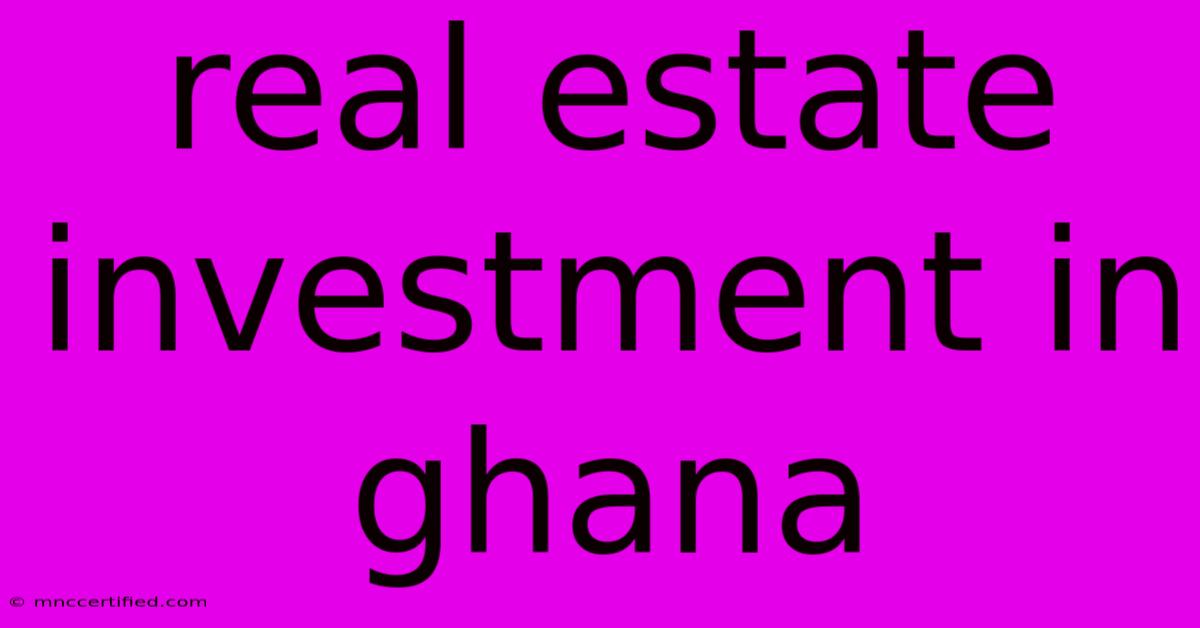Real Estate Investment In Ghana

Table of Contents
Real Estate Investment in Ghana: A Comprehensive Guide
Ghana's burgeoning economy and stable political landscape have made it a hotspot for real estate investment. This comprehensive guide explores the opportunities, challenges, and crucial factors to consider before investing in Ghanaian real estate.
Why Invest in Ghanaian Real Estate?
Ghana offers several compelling reasons for real estate investment:
- Strong Economic Growth: Ghana boasts a consistently growing economy, fueled by its thriving mining, agriculture, and service sectors. This translates to increased demand for housing and commercial properties, driving up property values.
- Stable Political Environment: Compared to some of its neighbors, Ghana enjoys a relatively stable political climate, fostering investor confidence. This stability minimizes political risks associated with property investment.
- High Return on Investment (ROI): Real estate in Ghana offers the potential for substantial returns, especially in rapidly developing urban areas like Accra and Kumasi. Rental yields can be significantly higher than in many developed markets.
- Growing Middle Class: Ghana's expanding middle class is fueling demand for modern housing and commercial spaces, creating numerous investment opportunities across various price points.
- Government Support: The Ghanaian government actively encourages foreign investment in real estate, providing various incentives and streamlining the investment process.
Types of Real Estate Investments in Ghana
Several real estate investment options cater to different risk tolerances and capital levels:
- Residential Properties: Apartments, townhouses, and single-family homes in burgeoning urban areas present excellent opportunities for rental income and capital appreciation.
- Commercial Real Estate: Office buildings, retail spaces, and shopping malls in major cities offer high rental yields and significant potential for long-term growth. However, these investments often require substantial capital.
- Land Investment: Purchasing undeveloped land can be a lucrative, albeit riskier, venture. Land values tend to appreciate significantly, particularly in areas experiencing rapid development. However, due diligence is crucial to avoid land disputes.
- Real Estate Investment Trusts (REITs): While still a relatively nascent market in Ghana, REITs offer a more accessible route to real estate investment, allowing investors to diversify their portfolio with smaller capital outlay.
Factors to Consider Before Investing
Before diving into Ghanaian real estate, consider these vital aspects:
- Due Diligence: Thoroughly investigate the property's title, legal status, and any encumbrances before committing. Engage a reputable lawyer specializing in Ghanaian property law.
- Location: The location significantly impacts property value and rental yield. Invest in areas with high growth potential and convenient access to amenities.
- Market Research: Analyze market trends, rental rates, and property values in your target area to make informed investment decisions.
- Financing Options: Explore available financing options, including mortgages from Ghanaian banks and international lenders. Understand interest rates and repayment terms.
- Legal and Regulatory Framework: Familiarize yourself with Ghana's property laws and regulations, including taxation and foreign ownership restrictions. Seek professional legal advice.
- Currency Fluctuations: Be aware of potential currency risks associated with investing in a foreign market. Consider hedging strategies to mitigate currency volatility.
Challenges and Risks
Investing in Ghanaian real estate isn't without its challenges:
- Land Disputes: Land ownership issues can be complex, so thorough due diligence is paramount.
- Infrastructure Development: While improving, infrastructure in some areas may lag behind, potentially affecting property values.
- Bureaucracy: Navigating bureaucratic processes can sometimes be time-consuming.
- Economic Volatility: While generally stable, Ghana’s economy is subject to fluctuations influenced by global markets.
Finding the Right Investment
Connecting with reputable real estate agents and developers familiar with the Ghanaian market is crucial. Networking within the industry and leveraging online resources can help identify promising investment opportunities. Remember, thorough research and professional advice are vital for a successful investment.
Conclusion
Real estate investment in Ghana presents exciting opportunities for substantial returns. However, careful planning, due diligence, and professional guidance are essential to navigate the market effectively and minimize risks. By understanding the opportunities and challenges, you can confidently position yourself for success in this dynamic and growing market.

Thank you for visiting our website wich cover about Real Estate Investment In Ghana. We hope the information provided has been useful to you. Feel free to contact us if you have any questions or need further assistance. See you next time and dont miss to bookmark.
Featured Posts
-
Bamboo Trading Company Club Bag
Nov 26, 2024
-
East India Trading Company Coin
Nov 26, 2024
-
Ronaldo Brace Al Nassr On Verge Of Acl
Nov 26, 2024
-
Gha 1 3 Nas Al Nassr Match Highlights
Nov 26, 2024
-
Missing Person Hannah Kobayashi Hawaii
Nov 26, 2024